Toggle Background Color
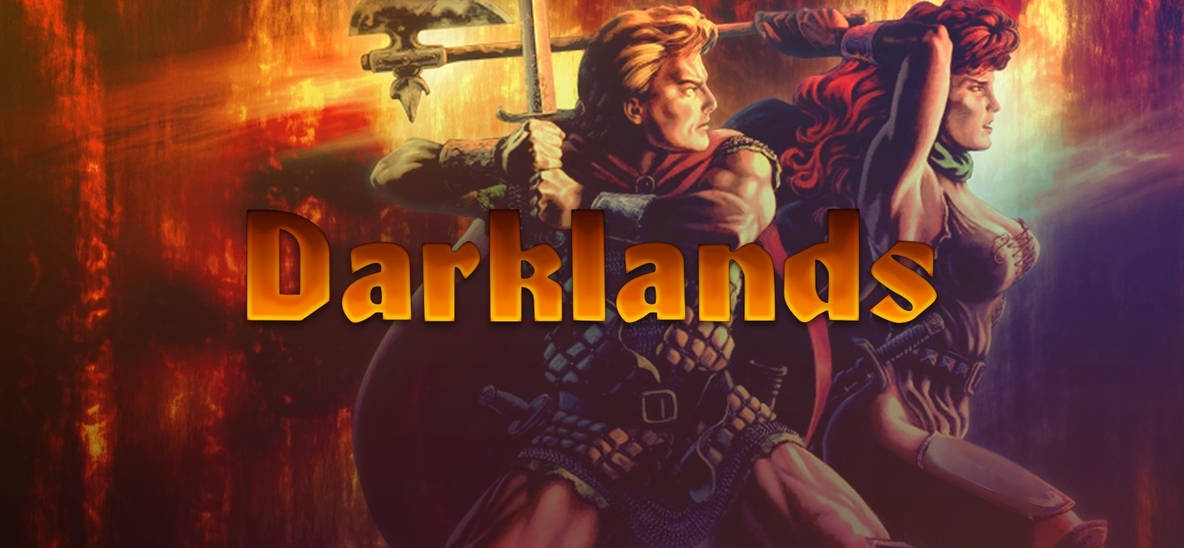
(click for Intro Video)
Darklands was released back in 1992 by Microprose, and remains the leading sandbox RPG to this day to a certain variety of nerd. I count myself among their number, and want to share this with the people who haven't heard about it remind a bunch of people that this game exists and make them want to play it again. For those of you who don't have this game (tsk tsk), you can buy it at GOG.com or on Steam (pretty sure you should get the GOG version from what I've heard, though).
Darklands bills itself as a realistic, historical RPG, insofar as one can be realistic when you throw witches that actually cast spells and fly on brooms, alchemy that actually works in ways that the mundane, bullshit alchemy of the day did not, priests who can actually call upon the power of God for immediate, convenient results and all sorts of supernatural beasts into the mix. When you don't know what you're doing, the game can be pretty damn harsh. Healing is a slow process that can take weeks, death is permanent and a loss in battle can leave you stranded naked in the wilderness without a pfenning to your name. However, the game provides you many tools to avoid even having to put yourself in danger. A good use of alchemy, saints and skills can drastically decrease the number of battles you have to face.
The first thing that I'm going to go into is the character generation, which will hit a great deal of the mechanical aspects of the game. Please feel free to throw out ideas for characters! Just.. don't get too attached to them; I'm going to go out of my way to show the dumb ways a character can die. I also don't plan on save scumming.
----------End OP------
This post is going to provide more information than you might want about the character generation, which will still probably not be enough. A lot of the information is based on the Darklands Clue Book, which is included with the GOG version of the game.
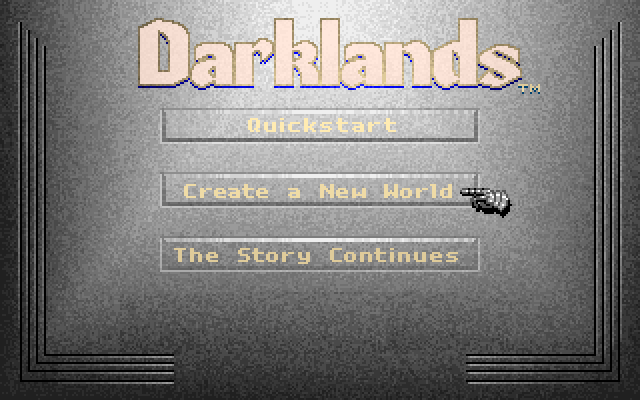
Quickstart will start you off with a fairly well balanced part that's suitable to getting started, but is by no means perfect. Instead, we select "Create a new world," taking us to the character creation process.
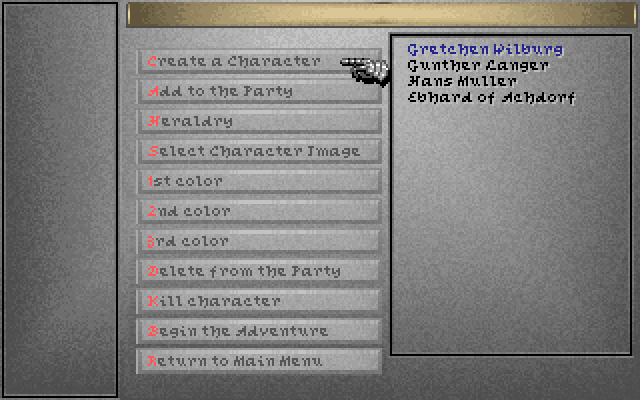
If you want to take a couple of the quickstart characters, they're available here. We select Create a Character.
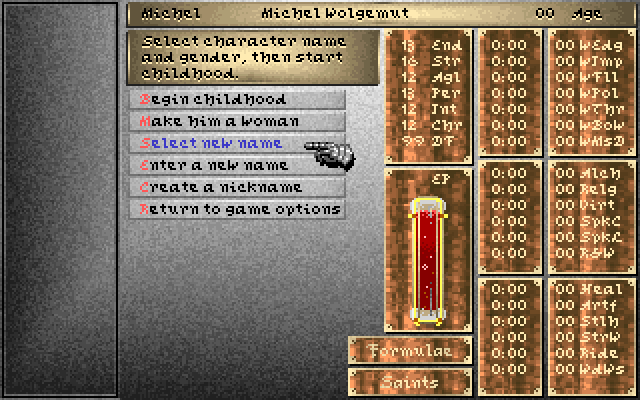
I typically use the generated names, which will use the first name as the nickname. The nickname is basically always used in the events, so the full name is basically just flavor. Gender has a couple of effects in game:
-Because of historical accuracy, there are a couple of religious jobs that are not available to female characters.
-To balance this, a couple of saints give extra prayer benefits if invoked by a female character
-I believe that a couple of events have actions that can only be done if a female character is in the party
-Some events will weight descriptions towards female characters
-Male characters start with 2 additional strength, female characters start with 1 additional endurance and 1 additional charisma.
If these differences sound insignificant to you, that's because they are in the grand scheme of things.
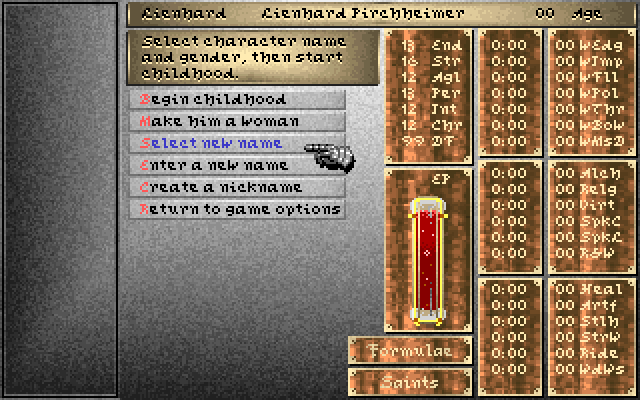
Finding a name I'm satisfied with, I select Begin Childhood.
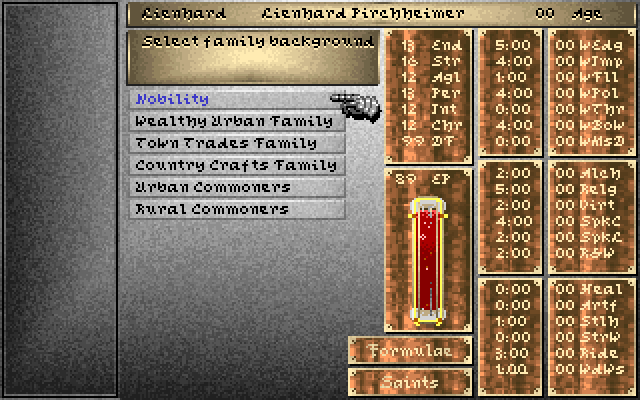
The family background determines what occupations will be offered, base skills and stats and how many Experience Points (EPs) are offered. EPs, represented by that bubbling flask, determine how many points can be distributed to stats at this point. Below is brief rundown of the backgrounds. Note that the value of Skills and Stats here is the sum of the bonuses provided per the Clue Book
Character Backgrounds
Nobility: 89 EPs, 40 Skills, 0 Stats. Additionally, Noble upbringing allows access to the Noble Heir occupation, which is pretty decent for a starting character in terms of Skills and EPs available. This background allows one of the fastest paths to the Priest and Knight occupations.
Wealthy Urban: 90 EPs, 39 Skills, +1 Stats. Allows access to Clerk and Courtier occupations, which are not very good on their own, but offer a quick path to better jobs. This background is slightly less effective in terms of skills for reaching priesthood and knighthood, but is just as fast as nobility overall.
Town Trades: 93 EPs, 37 Skills, +1 Stats. Allows faster access to the Merchant line (which I don't recommend) and the Craftsman line (which I don't recommend). Allows access to Swindler.
Country Crafts: 94 EPs, 33 Skills, +2 Stats. Pretty much the same occupation-wise as the Town Trades, but with Hunter instead of Swindler. Don't take Hunter if you pick this background, however.
Urban Commoner: 96 EPs, 30 Skills, +0 Stats. I'm pretty sure there is no good reason to take this background.
Rural Commoner: 97 EPs, 30 Skills, +1 Stats. Offers every occupation that Urban Commoner does, plus the Hunter occupation.
In general, I typically go for Rural Commoners for everyone. Nobility and Wealthy occupations can offer some good advantages early on in terms of equipment and skills without making your characters too old, but characters with those backgrounds will always have lower stats overall than those of lower background. Note that with a few special exceptions, there is no way to increase stats after character creation.
For this example however, I straight-up ignore my own advice and choose Nobility.

Next I allocate my stats. The EP requirements are:
Less than 30: 1 EP per point
Between 30 and 39: 2 EP per point
And 3 EP are required to go from 39 to 40, which is the maximum allowed score at this time. Many occupations will increase or decrease these scores, however.
Stat Descriptions:
Endurance (End): Represents non-life threatening damage and contributes to the amount of equipment a character can use before incurring penalties. This stat drops temporarily as a character takes damage. Once a character's current endurance reaches 0, the character is knocked out.
Strength (Str): Represents life threatening damage contributes to the amount of equipment a character can use before incurring penalties. This stat drops temporarily as a character takes damage. Once a character's current endurance reaches 0, the character is killed. Note- there is no resurrection in Darklands. Strength also has some other effects in certain circumstances.
Agility (Agl): Gives a few bonuses for lightly encumbered characters that aren't really worth it. Also has situational uses when speed is necessary. It's honestly not a particularly necessary stat.
Perception (Per): I believe having a character with high perception increases the chances of noticing a hostile encounter before it gets close, allowing a chance to escape without engaging. Also used to find traps and notice hidden doors in dungeons. Required for the Captain and several of the religious occupations.
Intelligence (Int): Affects success with Alchemy and I believe helps in dealing with academic types. A high int is required for the alchemist occupations, and some int is required for many other occupations.
Charisma (Chr): Affects shop prices and helps with actions involving speaking. Also required for the Captain and several of the religious occupations.
Generally I focus on having a high Endurance and Strength, plus one of the other four stats. Some occupations require a fairly balanced approach, though in general I feel that a character is best served specializing. Most of the time, only one character will be required to have a high stat/skill combination to accomplish a task, and it's difficult to have a balanced character without hurting Strength and Endurance (which should be as high as possible).
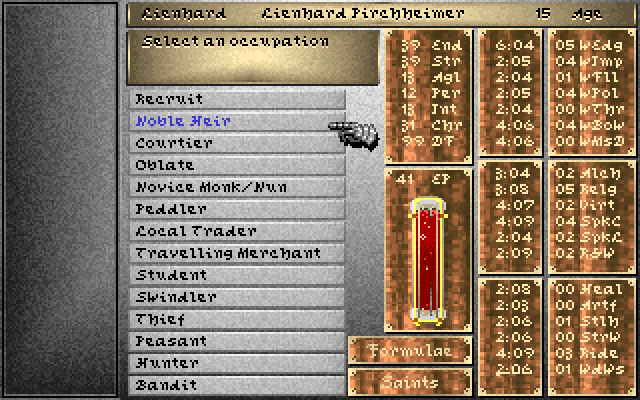
Strap yourselves in, because here's where shit gets real.
Once I finalize my stats, I can choose my first occupation. The clue book is a great guide to exactly what benefits each occupation provides. Each occupation ages a character 5 years and allows the distribution of a set EP value to skills, in addition to providing a set number of skill points and small stat changes. In general, jobs that offer a higher possible skill progression will offer fewer EPs. On top of that, once you reach 50 points in a skill, that skill will require 2 EPs per skill point. The end result is that a character will typically end up either well rounded with a couple of reasonably high skills, or have a couple of absurdly high skills but be awful at some necessary things (like combat).
Certain jobs also come with other perks, such as saints, alchemical formulas and equipment. The last occupation chosen determines starting equipment, while saints and alchemical formulas are cumulative between jobs. So it can be a good idea to take a job that offers good equipment after a bunch of academic or religious occupations.
For the most part, occupations follow certain lines. A few things to keep in mind about this approach, however:
-There are alternate paths in many of these lines
-A character isn't locked into a line once they start (so a veteran could become a student, then an alchemist if they meet other requirements)
-Some lines can lead in to other lines (one could go into the merchant line from Master Alchemist or Master Craftsman if they wanted to).
Occupation lines:
Noble Line: Courtier -> Courtier/Noble Heir -> Manorial Lord/Knight
Being a Courtier will allow a non-Noble background character to be a Noble Heir, but both jobs will fulfill the requirement to be a Manorial Lord or Knight. In general this line gives good Ride, Speak Common and Virtue. Additionally, Noble Heir and Knight aren't too bad for building combat ability. Knight requires a Virtue of 16, but gives you Brigandine and Chainmail armor- the best you can start off with. Manorial lord gives some very good bonuses to Charisma and is better for speak common, but it's probably better to be a knight if you go down this path. If you decide to make a character with a noble or wealthy background, it's probably best to go down this line.
Merchant Line: Peddler -> Local Trader -> Travelling Merchant -> Merchant Proprietor
These jobs all give good Speak Common, Streetwise and Read and Write. They also give bonuses to Charisma, which is good for your leader. However, with the exception of the local trader these are not very battle-ready occupations and they don't give saints or alchemical formulas to balance it out, so I tend not to go for them. Some Int is required for this line: Merchant Proprietor requires 20 Int.
Alchemist Line: Student/Clerk -> Alchemist -> Master Alchemist
Requires 30 Int for Alchemist and 35 int for Master Alchemist. Each time you take the Alchemist occupation you learn a new alchemical formula while Master Alchemist nets you two alchemical formulas. The formulas tend to be the lower quality ones, but since a character starts out with one of every potion they know the formula to, this can be a lucrative deal. Taking these classes raises a character's int, but is murder on Str and End so be careful not to overdo it.
Academic Line: Student/Clerk -> Physician/Professor
An alternate route from the Alchemist line, the physician provides a significantly higher Heal skill (but no alchemical formula). The professor is similar skill-wise to the alchemist (lower alchemy and higher heal) and provides a formula. None of these jobs have intelligence requirements, so this is your best bet if you want a stupid alchemist. Note that this is a bad idea since Int is necessary for using alchemy well. These classes also raise Int at a cost to Str and End.
Military Line: Recruit/Bandit -> Soldier -> Veteran -> Captain -> Knight
The Military line is primarily about using weapons, though it provides some of the survival skills as well (stealth, streetwise and woodwise). Each occupation gives better armor, so it's not a bad idea to have at least one person go down this path. Captain requires 20 in Per, Int and Chr, so it's better to use a rural commoner for this line to have enough EPs to distribute between these stats and keep a high End and Str. If a character reaches Captain and has 16 Virtue they could become a knight. The bonuses to strength and endurance that they get from these occupations will balance out the aging penalties, so this could actually be a good path for a rural commoner. Note that being a veteran lowers a character's charisma by 1, so plan accordingly to meet the requirements for captain.
Religious Line:
Novice Monk/Nun -> Friar*
Novice Monk/Nun -> Monk/Nun -> Priest* -> Abbot/Abbess -> Bishop*/Knight (
Novice Monk/Nun -> Monk/Nun x 2 -> Abbot/Abbess -> Knight
The jobs marked with an asterisk can only be taken by male characters.
The religious line is a bit less straightforward than most other lines, mostly because of the restrictions on female characters. Friar is a horrible trap and is for washouts that don't have the requisite Int, Per and Chr to properly follow this path. You should plan on having 20 in each for this line, and bishop requires 25 of each. Being a Noble can provide some alternative paths into this line. Being a Monk/Nun lowers perception by 1, but raises int by 1 so this should be factored in when planning stats. All of these jobs offer a saint, with Abbot/Abbess and bishop offering two saints. The religious line doesn't offer equipment, but offers a path to the Knight occupation so it may be worth considering the extra 5 years (note that the knight occupation itself doesn't offer a saint).
Craftsman Line: Apprentice Craftsman -> Journeyman Craftsman -> Master Craftsman
This line gives good artifice, which is necessary for breaking locks, disarming traps and certain other events. Apprentice and Journeyman give better combat skills while master gives better speak common. All of these are urban jobs, so they offer good streetwise as well. Note that Urban Trades and Country Crafts backgrounds allow a character to start at Journeyman. The downside to this path is that it doesn't offer any equipment, saints or formulas, and there aren't any good paths to knight to balance that like in the religious line.
Other jobs that don't really fit in anywhere else:
Shulz: An alternate ending to the Noble and Military lines, offers good Speak Common and a wide range of other skills with a high number of EPs to distribute.
Laborer and Peasant: Urban and rural themed respectively, offer high EPs but no specialties or real job advancement
Thief and Swindler: Urban jobs that offer great stealth and speak common respectively, but actually lower virtue.
Hunter and Bandit: Jobs with high stealth, woodwise and weapon skills. Bandit leads into the Military class starting at Soldier, hunter doesn't lead into anything.
Vagabond: Offers a high EP with good streetwise, woodwise and stealth, but doesn't lead to anything.
Oblate: Teaches religion and alchemy skills, and offers one formula per time the job is taken. The door to this job closes if you actually try to pursue a real religious or alchemical job.
Hermit: Requires a virtue of 15, offers a saint and a ridiculous amount of Virtue. No real job progression, however.
...Ok, it's over now. Back to character creation. Since I made a character with a Noble background, I choose the Noble Heir occupation.
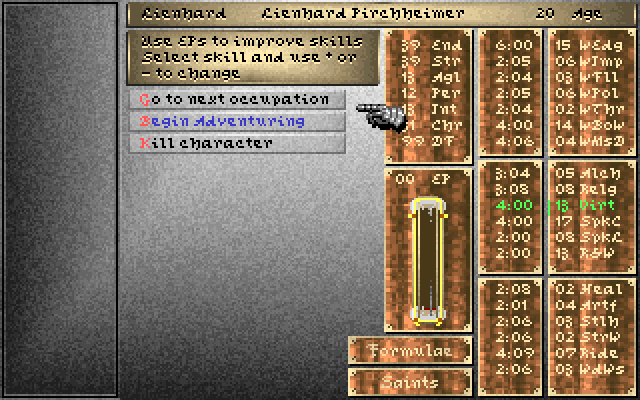
Noble Heir normally allows 21 EPs to distribute, but characters get a 20 point bonus for their first occupation, as well as two extra points to every skill. The skill numbers are given in the format of X:XX. The number before the colon represents the skill increases that happen regardless of how EPs are spend. The number after the colon represents how many points that can be purchased with EPs.
One last massive text dump for this post, I promise.
Skills and descriptions
Melee Weapon skills:
Edged Weapons (WEdg), Impact Weapons (WImp), Flail Weapons (WFll) and Polearms (WPol) are all melee weapons. In general, Impact weapons are better against heavily armed opponents but do less damage. Edged do more damage than impact and are lighter than polearms, but cost more. Polearms are similar to edged weapons in terms of damage and penetration, but are heavier. Flails are more similar to impact weapons, but don't give bonuses to high strength.
Having a high melee weapon skill with the weapon being wielded by the character will increase the chances of doing damage against the enemy, while decreasing the chances of taking damage.
Missile Weapon Skills:
Bows (WBow), Missile Devices (WMsD) and Thrown Weapons(WThr) represent the ranged weapons. Missile devices tend have greater penetration and damange, but are very slow. Bows are less damaging, but much faster than missile devices. Thrown weapons have low penetration capabilities, but are quick and do more damage than bows. Skill in throwing is also helpful when using Alchemy offensively.
Higher skill with a missile weapon increases the chances of actually hitting the enemy.
Alchemy (Alch): One of the factors that goes into the success chance for creating a potion. More details on this will be given at a later time.
Religion (Relg): Increases the likelihood that virtue will increase when doing good things, increases the rate of return of Divine Favor which is used to invoke saints.
Virtue (Virt): The important stat when invoking a saint, determines which saints can be used by a character. This "skill" increases and decreases depending on whether the party performs good or evil actions.
Speak Common (SpkC): The ability of a character to talk their way out of situations. Necessary for good party leader.
Speak Latin (SpkL) and Read and Write (R&W): Academic skills that help when dealing with other academics. There are a few rare situations where these come up outside of the city.
Healing (Heal): Is used to determine the rate of recovery when resting. For every 15 points of Healing Skill (rounded down), a character will regain 1 strength (so 2 Str at 30 points, 3 at 45, etc). Only the the highest Heal in the party counts towards this, so only one character should bother with this.
Artifice (Artf): Crafts ability that's important for picking locks and disarming traps. This skill is helpful in a few other areas as well.
Stealth (Stlh): Sneaking ability that's good for avoiding unwanted attention, but generally requires a high stealth for the entire part. It's difficult to increase this skill past character creation as it cannot be trained outside of using it.
Streetwise (StrW): Comes in handy when you're doing things around town that will lower your reputation. Also difficult to raise.
Ride (Ride): The ability to use mounts if a small number of events. This skill almost never comes up.
Woodwise (WdWs): Helps in dealing with the various fauna that can be found in the overworld.
And with that final dump out of the way, we can finish our character:
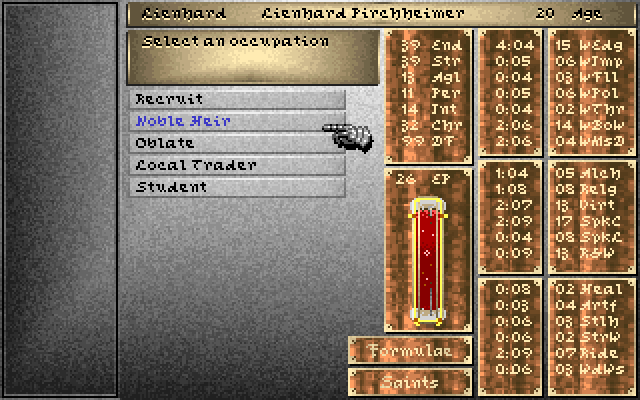
Sometimes taking one occupation can remove several other opportunities. Our list of choices has slimmed down considerable. We are just shy of the 16 Virtue that we need to become a Knight, so we take another stint at being a Noble Heir. You can see that this occupation only gives me 26 EPs this time: Taking an occupation at age 20 still gives 5 bonus EPs, so after this it would only be 21 EPs.

Here's my goal: Starting off as a Knight. It has an awfully low EP value, but the armor is worth it for characters that are just starting out.
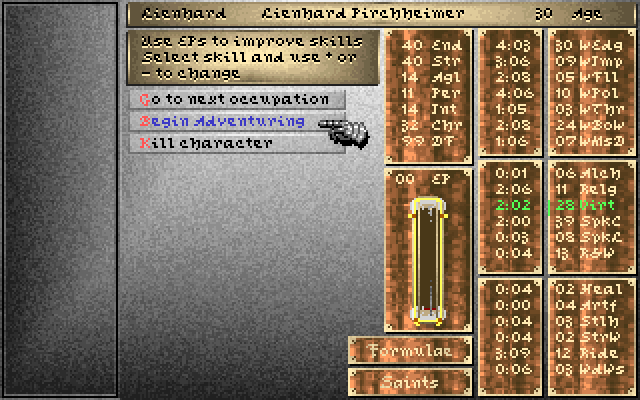
I spend all of my EPs and select Begin Adventuring.
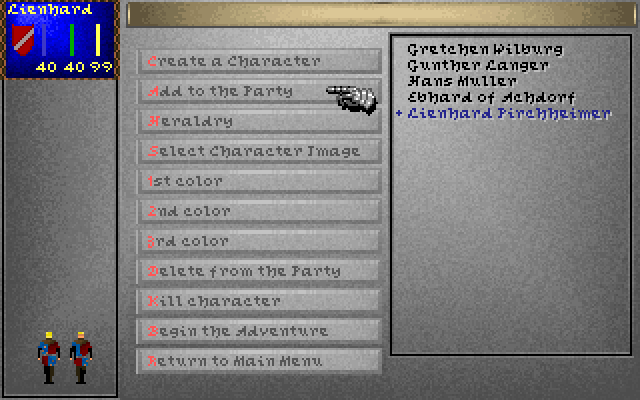
Not shown: Me clicking Add to the Party to actually add the character that I created. Now we can choose a couple more customization options. We can choose one of the four character models:

One of the 15 heraldry:
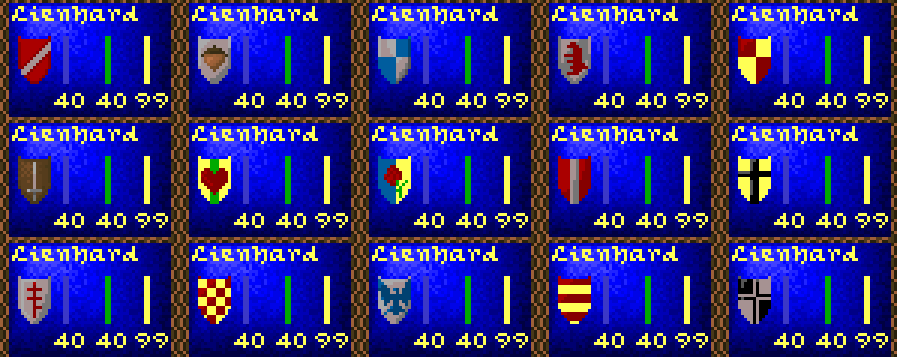
Elect not to give myself a garish outfit with the three color options, and check out my character by clicking on his name.

I'll have a good equipment dump later on, but the two pieces of equipment are tied for the best available. Starting quality (represent with the "q") us always 25. Since Lienhard's highest weapon skill is Edged weapons, he starts with a short sword.

Once he's equipped, the equipment shows on the character sheet.

Having gone through all of that, I start to make Lienhard a buddy.
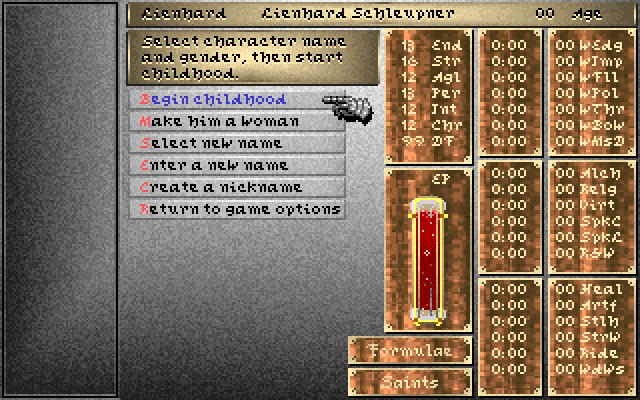
Who is also named Lienhard, incidentally.

The path that I'm going to have him take doesn't gain any benefit from Nobility, so I make him a rural commoner.
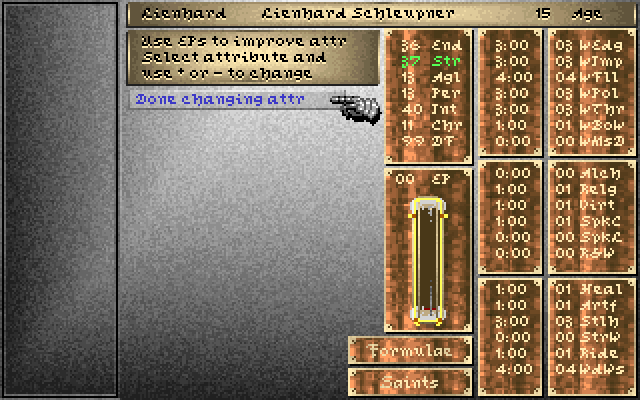
Lienhard 2 is a seriously smart peasant. Somehow he manages to put together more money than his hamlet is probably worth and go to a university.
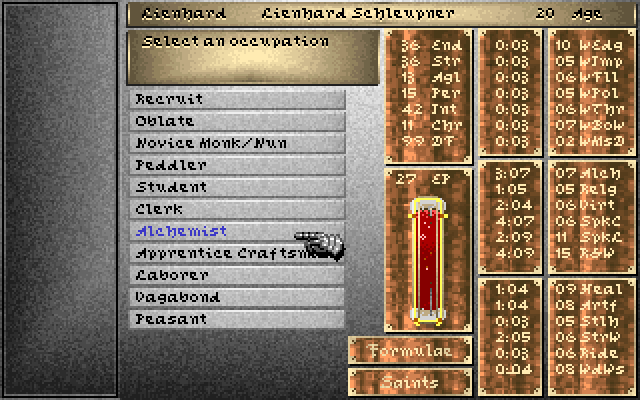
After 5 years of study, he's able to become an Alchemist thanks to his high intelligence.
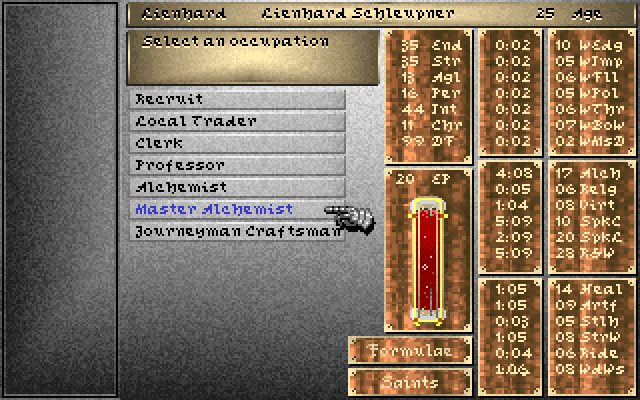
Since it's as high as it is, he is able to work his way towards Master Alchemist. I select this occupation several more times...
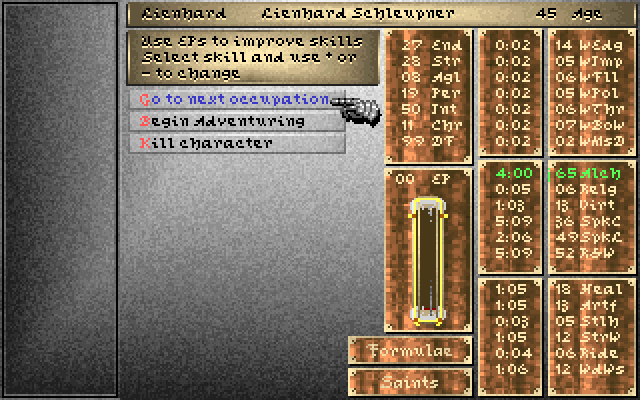
And start to realize that I might have taken things too far. If a 30 year old character takes an occupation, they will take a penalty to some of their stats. It gets more severe as you age, and if you take an occupation that lowers strength on top of it, you can quickly render your characters physically weak.
Note that, to the best of my knowledge, age only has an impact at character creation. Time passes in the game proper, but it won't actually cause a loss in stats.
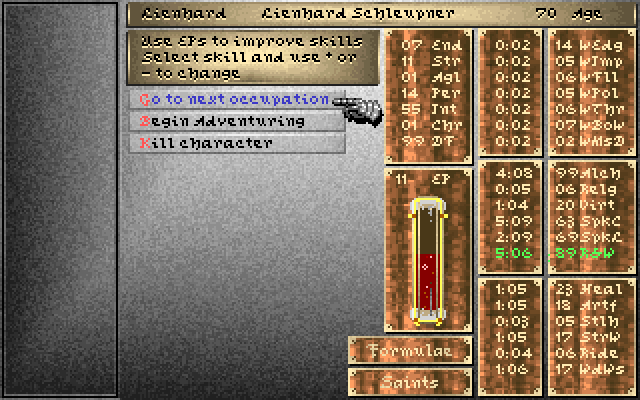
Once a character hits 70 years old, you won't be able to click "Go to next occupation" anymore. By this point, the character is probably weak to the point of pure uselessness in battle anyways.
That said, if you press the "G" key, you'll still go to the next occupation.
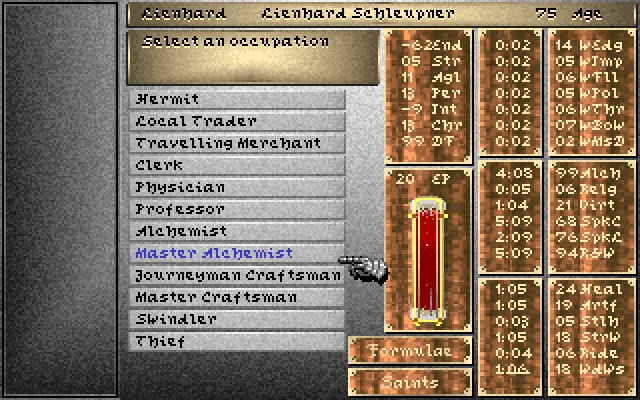
Kind of a silly oversight, really. Your stats will start to go nuts, which will also affect your occupation options.
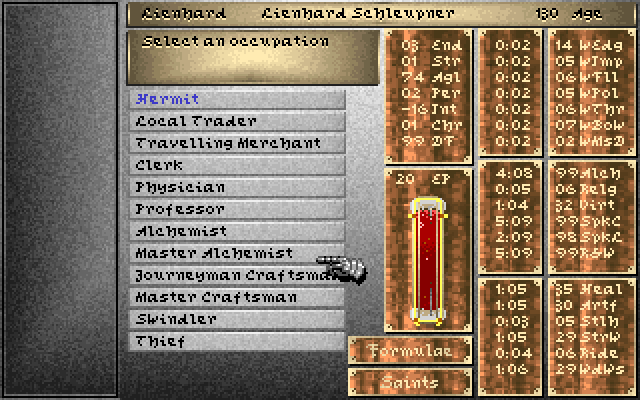
At 135 years young, Lienhard 2 decides to quit the alchemy business, satisfied with having discovered the secret to eternal life.
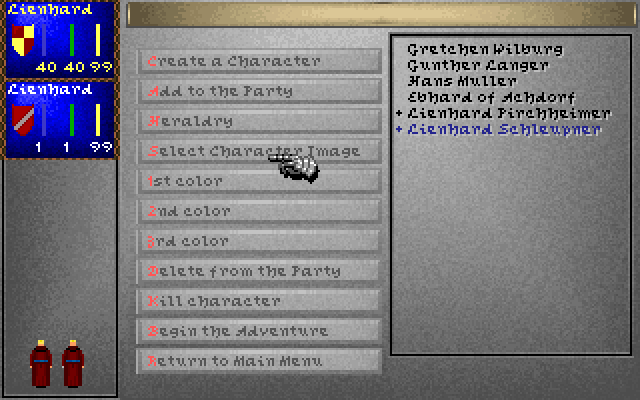
I give him the fitting fat old man character image.

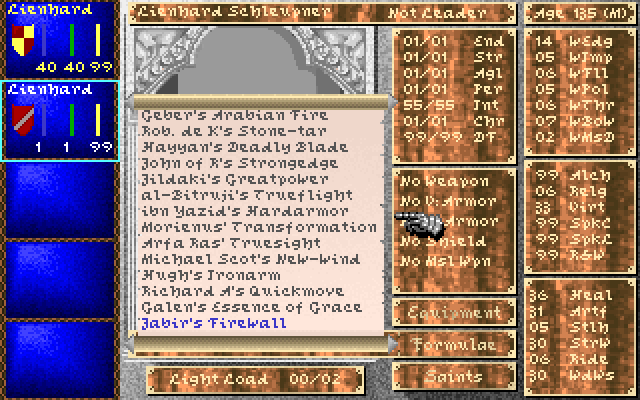
He has learned far more than any man ever should. Alchemy will also be covered at a later time so we can discuss the significance of starting off with all of this.
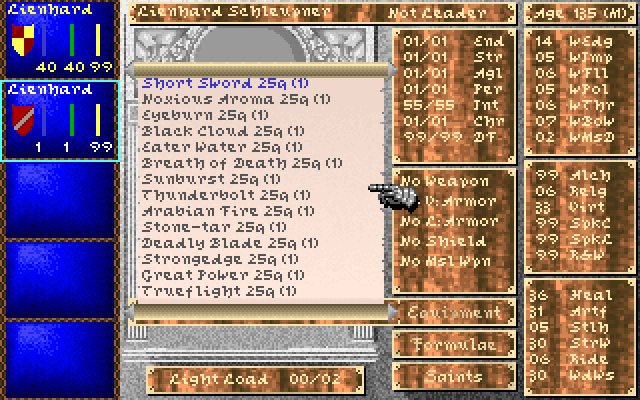
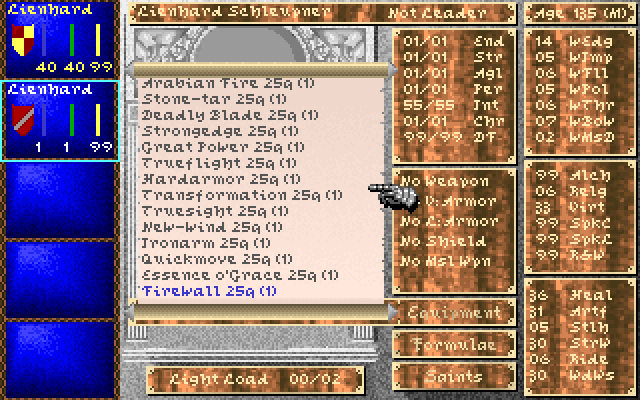
He also starts off with every potion that he knows the formula, though only at 25q, and only one of each. If you wanted to cheat, you could start with some serious cash if you did this on multiple characters, though you would need to spend it before you could retire the characters (voluntarily).
This wraps up my character creation effort post. Please let me know what characters you would like me to kill off first include on our exiting adventure!































